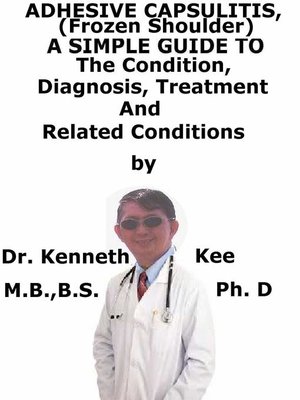Adhesive Capsulitis, (Frozen Shoulder) a Simple Guide to the Condition, Diagnosis, Treatment and Related Conditions
ebook
By Kenneth Kee

Sign up to save your library
With an OverDrive account, you can save your favorite libraries for at-a-glance information about availability. Find out more about OverDrive accounts.
Find this title in Libby, the library reading app by OverDrive.



Search for a digital library with this title
Title found at these libraries:
| Library Name | Distance |
|---|---|
| Loading... |
This book describes Adhesive Capsulitis, Diagnosis and Treatment and Related Diseases
Adhesive Capsulitis is also known as Frozen Shoulder Syndrome (FSS), a disorder of the shoulder featured by the slow onset of pain and restricted shoulder movement.
Adhesive capsulitis of the shoulder produces pain and stiffness in the shoulder.
Over time the shoulder becomes very stiff to move and is called frozen.
It is likely to be chronic and full recovery may require several months.
Primary idiopathic Adhesive Capsulitis is often linked with other disease such as diabetes and may be the first presentation of diabetes mellitus.
Patients with systemic diseases such as thyroid diseases and Parkinsonism have a higher risk of adhesive capsulitis.
Secondary Adhesive Capsulitis can happen after shoulder injuries or immobilizations e.g., rotator cuff injuries, sub-acromial impingement, biceps tenosynovitis, and cardiac tendonitis.
These patients develop pain from shoulder pathology leading to reduced movement in the shoulder and thus developing Adhesive Capsulitis.
The most important sign of Adhesive Capsulitis is being unable to move the shoulder either by the patient or with the help of someone else.
It progresses in three stages:
a. Freezing
In the freezing stage the shoulder slowly has more and more pain that typically worsens at night.
As the pain worsens, the shoulder loses range of motion.
Freezing normally lasts from 2 to 9 months.
b. Frozen
Painful symptoms may actually become better during this stage but the stiffness and tightness remains.
There is a typical progressive loss of gleno-humeral flexion, abduction, internal rotation, and external rotation.
For the 4 to 12 months of the frozen stage daily activities of the shoulder may become very difficult.
c. Thawing
Shoulder range of motion slowly gradually returns during the thawing stage.
Complete return to normal or close to normal strength and motion usually takes from 6 months to 2 years.
While adhesive capsulitis is self limiting usually resolving in 1- years, it can persists, presenting symptoms that are often mild pain, the most frequent complaint.
Cause
The exact cause is unknown but several conditions have been blamed:
Bicipital tenosynovitis
Rotator cuff tendonitis
Reflex sympathetic dystrophy
Trauma
Immobilization
Diabetes
Symptoms:
Pain
Decreased motion of the shoulder
Stiffness
Diagnosis:
People with Adhesive Capsulitis have restricted range of shoulder motion both actively and passively
Magnetic resonance imaging (MRI) and ultrasound can create better images of problems with soft tissues such as a torn rotator cuff, not for Adhesive Capsulitis
Conservative treatment:
1.Initial phase:
Rest
Moist heat
Pain killers such as NSAID
Muscle relaxant
Injection of local anesthetic and long acting steroid
2.Mobilization phase:
Physiotherapy such as traction, shortwave diathermy
Gradual mobilization and exercises
3.Maintenance phase:
Continual exercises of the shoulder muscles
Avoidance of strain on the muscles of the shoulder
Steroid injections plus physical therapy can improve the range of motion.
It can take a few weeks to see improvement in the Adhesive Capsulitis.
It may take as long as 6 to 9 months for complete recovery.
Physical therapy is intense and needs to be done every day.
Left untreated the condition very often improves by itself within 2 years with little loss of motion.
Risk factors for Adhesive Capsulitis such as diabetes or thyroid...







